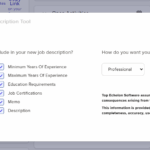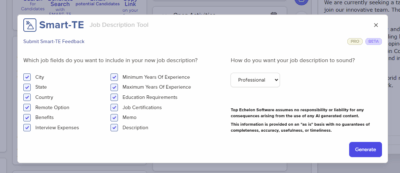In the recruiting profession, there is nothing more valuable than trust. Clients won’t hire you if they don’t trust you. Candidates won’t work with you if they don’t trust you.
Trust is the foundation upon which successful businesses are built, and it’s the key driver of long-term growth. Trustworthy relationships with clients, candidates, and even within your own team can transform a good recruiting agency into a great one.
With that in mind, this blog post will explore the multifaceted role of trust in the recruiting industry and provide actionable strategies for building and maintaining trust to drive business growth.
The Importance of Trust in Recruiting
Trust is a cornerstone of effective recruiting. Without it, the relationships between recruiters, clients, and candidates are fragile and prone to breakdowns. Here are several reasons why trust is so crucial in the recruitment industry:
- Client Retention and Loyalty
- Candidate Engagement and Satisfaction
- Internal Team Cohesion
- Reputation and Brand Strength
Client Retention and Loyalty
Clients who trust their recruiters are more likely to return for future hiring needs and to recommend their services to others. Trust fosters loyalty, which in turn ensures a steady stream of business and referrals.
- Consistency: Providing consistent, high-quality service builds trust over time. Clients appreciate knowing they can rely on you to deliver top-notch candidates who fit their requirements.
- Transparency: Being transparent about your processes, pricing, and potential challenges demonstrates integrity and builds trust. Clients are more likely to stick with a recruiter who is honest, even when things don’t go as planned.
Candidate Engagement and Satisfaction
Candidates who trust their recruiters are more likely to engage actively in the recruitment process, provide accurate information, and accept job offers. Trust enhances candidate satisfaction, which can lead to positive word-of-mouth and repeat business.
- Respect and Honesty: Treating candidates with respect and being honest about their prospects and the recruitment process fosters trust and engagement.
- Support and Guidance: Offering personalized support and guidance throughout the recruitment process demonstrates that you have the candidate’s best interests at heart.
Internal Team Cohesion
Within an agency, trust among team members fosters a collaborative and productive work environment. A cohesive team is more efficient, innovative, and capable of delivering high-quality service to clients and candidates.
- Communication: Open and honest communication within the team builds trust and ensures everyone is on the same page.
- Supportive Culture: Creating a culture where team members support each other and trust in their collective abilities leads to better outcomes and a more positive work environment.
Reputation and Brand Strength
A reputation for trustworthiness can set your agency apart in a crowded market. Trust is a key component of your brand identity and can be a major factor in attracting both clients and candidates.
- Testimonials and Reviews: Positive testimonials and reviews from clients and candidates reinforce your reputation for trustworthiness.
- Ethical Standards: Adhering to high ethical standards in all your dealings strengthens your brand and builds long-term trust.
Building Trust with Clients
Building trust with clients is a multi-faceted process that involves clear communication, delivering on promises, and providing exceptional service. Here are some strategies to help build and maintain trust with clients:
Clear Communication
Effective communication is the foundation of trust. Clients need to feel informed and confident in your ability to meet their needs.
- Regular Updates: Keep clients informed about the progress of their search. Regular updates provide reassurance and demonstrate your commitment to their success.
- Listening: Take the time to listen to your clients’ needs and concerns. Understanding their unique challenges and objectives helps build a stronger relationship.
- Transparency: Be transparent about your processes, fees, and any potential challenges. Clients appreciate honesty and are more likely to trust you if they feel you are upfront and clear.
Delivering on Promises
Meeting or exceeding client expectations consistently is crucial for building trust. Clients need to know they can rely on you to deliver what you promise.
- Quality Candidates: Focus on presenting high-quality candidates who meet the client’s specifications. This shows that you understand their needs and are committed to finding the best fit.
- Timeliness: Adhere to agreed-upon timelines. Meeting deadlines demonstrates reliability and respect for the client’s time and needs.
- Follow-Through: Ensure that all promises made during the initial discussions are followed through. This could include providing additional services, conducting follow-up meetings, or delivering reports.
Providing Exceptional Service
Exceptional service goes beyond meeting basic expectations. It involves anticipating client needs and going the extra mile to ensure satisfaction.
- Personalized Approach: Tailor your approach to each client’s unique needs and preferences. This personal touch shows that you value their business and are dedicated to their success.
- Proactive Solutions: Anticipate potential issues and offer proactive solutions. This demonstrates foresight and a commitment to client satisfaction.
- Feedback Loop: Establish a feedback loop where clients can share their experiences and suggestions for improvement. Acting on this feedback shows that you are committed to continuous improvement.
Building Trust with Candidates
Candidates are the lifeblood of any recruitment agency. Building trust with them is essential for successful placements and long-term relationships. Here are some strategies to help build and maintain trust with candidates:
Respect and Honesty
Treating candidates with respect and honesty from the outset sets the tone for a trustworthy relationship.
- Clear Expectations: Set clear expectations about the recruitment process, timelines, and the roles being offered. Transparency helps manage candidate expectations and builds trust.
- Honest Feedback: Provide honest feedback about the candidate’s prospects and performance. Constructive criticism helps candidates improve and shows that you are invested in their success.
- Respecting Privacy: Respect candidates’ privacy and handle their personal information with care. This demonstrates professionalism and builds trust.
Support and Guidance
Providing support and guidance throughout the recruitment process helps candidates feel valued and supported.
- Preparation: Offer preparation sessions to help candidates succeed in interviews. This can include mock interviews, resume reviews, and tips on how to present themselves.
- Availability: Make yourself available to answer candidates’ questions and address their concerns. This shows that you are committed to their success and builds trust.
- Follow-Up: Follow up with candidates after interviews and provide updates on their application status. This keeps them informed and engaged in the process.
Creating a Positive Candidate Experience
A positive candidate experience enhances satisfaction and builds long-term trust.
- Personalized Interactions: Tailor your interactions to each candidate’s unique needs and preferences. This personal touch shows that you value their individuality.
- Timely Communication: Communicate with candidates in a timely manner. Prompt responses show that you respect their time and are committed to their success.
- Recognition: Recognize and celebrate candidates’ achievements and milestones. This creates a positive and supportive environment that builds trust.
Building Trust Within Your Team
Trust within your team is essential for a cohesive and productive work environment. Here are some strategies to help build and maintain trust within your team:
Open Communication
Open and honest communication within the team fosters trust and collaboration.
- Regular Meetings: Hold regular team meetings to discuss progress, challenges, and opportunities. This ensures everyone is on the same page and fosters a sense of unity.
- Transparency: Be transparent about the company’s goals, challenges, and successes. This builds trust and a sense of shared purpose.
- Active Listening: Encourage team members to share their ideas and concerns. Actively listening to their input shows that you value their contributions and builds trust.
Supportive Culture
Creating a supportive culture where team members feel valued and respected fosters trust and collaboration.
- Recognition and Appreciation: Recognize and appreciate team members’ efforts and achievements. This shows that you value their contributions and builds trust.
- Support and Development: Provide support and opportunities for professional development. Investing in your team’s growth shows that you are committed to their success and builds trust.
- Team Building: Organize team-building activities that foster collaboration and strengthen relationships. This creates a positive and supportive work environment.
Leading by Example
Leading by example sets the tone for a trustworthy and collaborative work environment.
- Integrity: Demonstrate integrity in all your dealings. Being honest, transparent, and consistent builds trust and sets a positive example for your team.
- Accountability: Take responsibility for your actions and decisions. This shows that you are accountable and trustworthy.
- Empathy: Show empathy and understanding towards your team members. This creates a supportive and trusting environment.
Measuring Trust
Measuring trust within your agency and with clients and candidates is crucial for understanding its impact and identifying areas for improvement. Here are some methods to measure trust:
Client Feedback
Regularly seek feedback from clients to gauge their level of trust and satisfaction.
- Surveys: Conduct regular surveys to gather feedback on your services and the client’s experience. This provides valuable insights into their trust levels and areas for improvement.
- Interviews: Hold regular interviews or meetings with clients to discuss their experiences and gather feedback. This allows for a deeper understanding of their trust levels and any concerns they may have.
Candidate Feedback
Gathering feedback from candidates provides insights into their trust and satisfaction.
- Exit Surveys: Conduct exit surveys with candidates who have completed the recruitment process. This provides insights into their experience and trust levels.
- Follow-Up Interviews: Hold follow-up interviews with candidates to discuss their experience and gather feedback. This allows for a deeper understanding of their trust levels and any concerns they may have.
Internal Team Feedback
Regularly seek feedback from your team to gauge their level of trust and satisfaction.
- Employee Surveys: Conduct regular employee surveys to gather feedback on their experience and trust levels. This provides valuable insights into the team’s dynamics and areas for improvement.
- One-on-One Meetings: Hold regular one-on-one meetings with team members to discuss their experiences and gather feedback. This allows for a deeper understanding of their trust levels and any concerns they may have.
Case Studies and Examples
To illustrate the importance of trust in driving business growth, consider the following case studies and examples:
Case Study 1: Building Client Trust Through Transparency
A recruitment agency was struggling to retain clients and secure repeat business. The agency decided to focus on building trust through transparency. They implemented a policy of clear and honest communication, providing regular updates on the recruitment process and being upfront about potential challenges.
As a result, clients began to appreciate the agency’s honesty and reliability. The agency saw an increase in client retention and repeat business. Clients also started referring the agency to others, leading to a steady stream of new business.
Case Study 2: Enhancing Candidate Trust Through Support
A recruitment agency noticed that many candidates were disengaged and dropping out of the recruitment process. The agency decided to focus on building trust by providing personalized support and guidance to candidates.
They implemented preparation sessions to help candidates succeed in interviews, provided timely updates on their application status, and offered constructive feedback. This supportive approach significantly improved candidate engagement and satisfaction. Candidates started recommending the agency to others, leading to an increase in high-quality applicants.
Trust: The Bottom Line
In the world of agency recruiting and search consulting, trust is more than just a nice-to-have; it is a crucial currency that drives business growth. Building and maintaining trust with clients, candidates, and within your team is essential for long-term success. By focusing on clear communication, delivering on promises, providing exceptional service, and fostering a supportive and collaborative work environment, recruiters can build trust and drive business growth.
Trust transforms the recruitment process from a transactional interaction into a meaningful and lasting relationship. It enhances client loyalty, candidate engagement, and team cohesion, ultimately contributing to a strong reputation and brand strength. Embracing trust as a core value not only enhances business success but also creates a positive and enriching professional environment where clients, candidates, and team members feel valued, understood, and supported.








